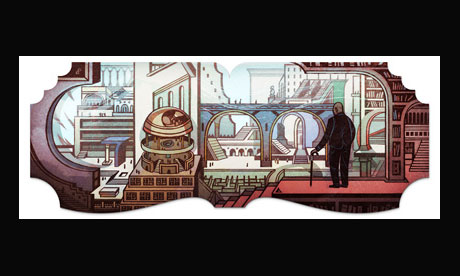The labyrinthine mind of Jorge Luis Borges was celebrated today by Google with a doodle to mark what would have been the great Argentinian author's 112th birthday.
The search engine's sketch shows an elderly man in a suit looking out over a maze of staircases, buildings and bookshelves – "a wide, fantastic architecture scenery," said Google - in what could be a representation of one of Borges's most famous stories: The Library of Babel. "The universe (which others call the Library) is composed of an indefinite and perhaps infinite number of hexagonal galleries, with vast air shafts between, surrounded by very low railings," wrote the author, who died in 1986. "Also through here passes a spiral stairway, which sinks abysmally and soars upwards to remote distances. In the hallway there is a mirror which faithfully duplicates all appearances. Men usually infer from this mirror that the Library is not infinite (if it were, why this illusory duplication?); I prefer to dream that its polished surfaces represent and promise the infinite."
The doodle could also be paying homage to his story The Garden of Forking Paths, in which he writes: "I thought of a labyrinth of labyrinths, of one sinuous spreading labyrinth that would encompass the past and the future and in some way involve the stars."
A short story writer, poet and essayist, Borges was one of the giants of 20th century literature. Born in Buenos Aires on 24 August 1899, he worked – appropriately enough – as a librarian, starting his writing career as a poet. His creativity was unleashed following a severe head wound in 1938, after which he went on to write some of his best known works, from the fantastical stories collected in Ficciones to his seminal short work The Aleph.
Known for the nightmarishly dreamlike, surreal worlds he conjures up, Borges struggled with blindness and steered clear of writing novels, preferring to concentrate on shorter works. He only achieved international fame in 1961 when he won the Prix Formentor with Samuel Beckett for Ficciones, and was translated into English in 1962 with the collection Labyrinths. In 1965, John Updike noted "the belated North American acknowledgment of the genius of Jorge Luis Borges" in an essay for the New Yorker.
Despite the debt he is owed by authors from Gabriel García Márquez to Mario Vargas Llosa, Borges himself never won the Nobel prize. "Not granting me the Nobel prize has become a Scandinavian tradition; since I was born they have not been granting it to me," he once said.
"Borges' works have contributed to the genre of science fiction as well as the genre of magical realism. Happy birthday, Jorge Luis Borges," said Google in a YouTube animation of its doodle






啊,多打了一個新字~~~
發現到一定年紀,喜歡的文學風格會變
我現在對科幻不感興趣了,更喜歡寫實的,報告文學和任務傳記之類。。。
問好新心妹
謝謝心心分享。